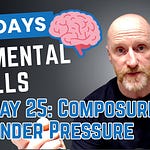What do you imagine about yourself and others? What images and pictures appear on the movie screen of your mind as you move through your day? Do you imagine how good you are perceived at your work and how great it will be when you obtain that promotion, or do you imagine being sacked because you’re not quite as sharp as you think you should be? What about knowledge, skills, ability, talent and intelligence—do you imagine you have these in sufficient quantities to succeed, or are you bluffing it? What are your prevailing thoughts about yourself?
I’m not suggesting that you walk around all day in a delusional state, disregarding reality, kidding yourself in the face of evidence to the contrary. I strongly suggest that you pay attention to the world around you and the feedback it provides. After all, you don’t want to be mowed down crossing the road. Acceptance of what is, of your current experience and level of expertise, is the starting point for an improved life experience, so get comfortable with what is. That said, if you continually rehearse in your mind the same or similar situations over and over again, it will be very difficult to experience anything other than that, especially if strong emotion accompanies the imagined situation.
Consider the person who is unhappy in their job and mentally rehearses confrontations with work colleagues and customers. Ask yourself, could they possibly be in a mood at work that could lead to positive experiences? If all they do is expect confrontation, is that not what they will meet? Are they not primed for it? Every interaction will be an opportunity for their experience to prove to them they were right. Every comment will be a jab at their competency. Every mini-failure may be viewed as evidence that this job is the worst. They see the world and everyone with whom the interact through the lens of, “this job is shit, and everyone is an asshole.” Remember our session on Locus of Control?
Now, consider a goal you wish to achieve. How do you imagine it?
Are you holding fast to the outcome despite current experiences, or do you allow mini-failures to overly influence your imagined result? Most people don’t realise that the content of their imagination, especially where it’s coupled with strong emotion, influences their future experiences. With the thoughts we think from moment to moment, we are literally tuning our organism toward those ends. It is not that you are somehow magically creating your own future, but you are, in a sense. With the movies you imagine, and with the emotion attached to them, you are tuning your attentional faculties towards those experiences.
If fear is what you constantly imagine for yourself tomorrow, next week, next month, then your amygdala will be lit up like a Christmas tree—permanently. Your brain will be wired to expect problems. If optimistic thoughts for tomorrow occupy your mind, then you will expect tomorrow to be better than today. Your brain, mind and body (your System 1) will be tuned to find improved life experiences without your conscious effort. This is not magical thinking; this is the science of psychology and neuropsychology.
Now, all this doesn’t mean that shit won’t happen, after all, many things are outside your control, but it will help you better manage difficult situations. When you choose to imagine a better tomorrow, you will build personal resilience and more positive expectations. Your right-now lived experience will be improved, and after all, now is all you have, so you’d better live it as best you can because you may be gone in an instant. Rather than the prospect of death being something to be depressed about, you make it something to be positive about.
My message is to choose to imagine a better outcome, not only for yourself, but also for others. When you have time to kill, use it purposely. When you’re on the bus or the train, when you’re queuing for coffee, or you’re waiting for a friend, and at night before you go to sleep, instead of letting your mind drift to automatic negative outcomes, think again. Choose a better but realistic picture to ponder. See things working out for you and others. Start small with things that are believable. This is important because the emotion associated with the thought has a profound impact on your psychological state. In other words, you’ve got to believe the pictures you hold in your mind about tomorrow (or next week or ten minutes’ time) are possible. When you master the small things, move to imagine bigger and better things.
In the next few sessions of 30 Days of Mental Skills, I’ll be walking you through structured strategies that, for example, professional athletes use to refine their skills and prepare themselves for competition. You can also apply these methods in your work, business, and daily life, so watch out for those sessions.
Mental Skills Basics Course
Suffering stress and anxiety is not a prerequisite for success in self-employment–there's a better way. Mental skills provide you with the means of coping effectively with difficulty and achieving your goals. I created the Mental Skills Basics Course to introduce business leaders, self-employed individuals, freelancers, consultants, and small business owners to the psychological and emotional skills associated with success.










